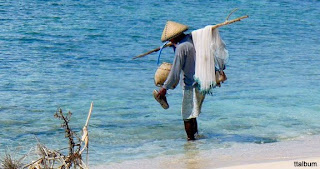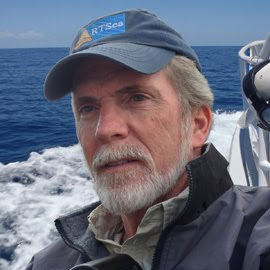 There's a lot that needs to be done to protect the planet and its natural resources. Our lives and those of countless plants and animals depend on action being taken, but sometimes the scientific facts, the ecological implications, are not enough to motivate people to take quantifiable steps either in action or in attitude.
There's a lot that needs to be done to protect the planet and its natural resources. Our lives and those of countless plants and animals depend on action being taken, but sometimes the scientific facts, the ecological implications, are not enough to motivate people to take quantifiable steps either in action or in attitude.This week, in Singapore, The Economist sponsored a World Oceans Summit, bringing together many of the recognized leaders in ocean conservation with leading international financiers because it will be the economic impacts that stimulate the policy and decision makers to act on behalf of the environment. And in today's complex world economy, developing nations can have an impact on major powers and vice versa.
At the summit, Robert Zoellick, president of the World Bank Group, proposed "a new S.O.S.: Save Our Seas." In opening remarks, he expressed the importance of sound ocean conservation and management as a source of potential economic prosperity for many developing nations that have come to depend on the riches of the sea as a major food source and economic engine. But they are not alone. The major developed nations are invariably linked to the future of developing nations and so it is in every one's best interests that we look at what is happening to the oceans.
For some conservationists, talking about the worldwide economic ramifications may not be as "sexy" as sticking to strictly scientific or aquatic subject matter, but it can't be ignored. If we are to move mountains to protect the seas, it will be economics that stimulates the effort required.
"Oceans are the home of an under-recognized and under-appreciated "blue economy." At a time when the world is looking for sources of growth, there is huge potential for "blue growth" - wisely preserving and investing in the value of ocean ecosystems to fight poverty and improve lives," said Zoellick.
Recognizing that individual efforts by nations and NGOs, as important as they may be, are not enough to stem the worldwide degradation of the oceans and its resources, Zoellick promoted the need for a greater international commitment, including a financial commitment - one in which there will be a return on the investment.
"Today, I want to propose a new approach - an unprecedented Global Partnership for Oceans. This Partnership will bring together countries, scientific centers, NGOs, international organizations, foundations, and the private sector to pool knowledge, experience, expertise, and investment around a set of agreed upon goals. These goals can sharpen our focus, encourage common and reinforcing efforts, and compel us to measure performance.
Together, we will build on the excellent work already being done to address the threats to oceans, identify workable solutions, and scale them. We can also mobilize financing where there are gaps. I've seen in other areas that the World Bank Group is fortunately positioned to catalyze and help organize such a global partnership effort."
He also put forth several goals that his proposed Global Partnership for Oceans should achieve.
"We should rebuild at least half the world's fish stocks identified as depleted: About 85 percent of ocean fisheries are fully exploited, over-exploited, or depleted. This includes most of the stocks of the top ten fish species, or about 30 percent of the world's marine capture fisheries production. There's no room for further expansion - we need to start rebuilding.
We should increase the annual net benefits of fisheries to between $20 and $30 billion. We estimate that global fisheries currently run a net economic loss of about $5 billion per year. We need to turn this around, by allocating and enforcing the rights of fisheries and reforming subsidies.
We should more than double the area covered by marine protected areas. Currently, less than 2 percent of the ocean's surface is protected - compared to around 12 percent of land. Let's increase this to 5 percent
 We will need to work with governments and stakeholders to identify and establish sound marine protected areas where they can contribute direct economic benefits. The scale will depend on the context: for example, in some areas, we might work with communities to introduce small-scale protected areas on local coral reef systems, while in others we may work with national governments to identify and protect large areas as part of a wider strategy for the country's ocean ecosystems.
We will need to work with governments and stakeholders to identify and establish sound marine protected areas where they can contribute direct economic benefits. The scale will depend on the context: for example, in some areas, we might work with communities to introduce small-scale protected areas on local coral reef systems, while in others we may work with national governments to identify and protect large areas as part of a wider strategy for the country's ocean ecosystems.
We would build on the idea of supporting networks of marine protected areas, such as island chains in the Pacific. A number of these networks already exist, but have yet to be fully implemented.
And we should increase sustainable aquaculture to provide two thirds of the world's fish. Today, that figure is about 50 percent, but there are serious concerns over disease management, feed use, and introduction of non-native species. We need to do much better, not only to help secure a reliable source of food, but also to take the pressure off of ocean fish stocks."
These goals sound very much like what you would here from a leader in ocean conservation, fishery management, or ocean research. But it's coming from an international banker. What makes an event like the World Ocean Summit noteworthy is that it demonstrates that environmental issues, like ocean conservation, are not feel good issues of the moment that can be easily set aside or disposed of when politically inconvenient. They represent both ecological and economical implications that can have a profound effect on humankind.
Click here to read Mr. Zoellick's entire opening remarks. Also in attendance was Dr. Sylvia Earle, leading ocean advocate and National Geographic Explorer-in-Residence. Click here to read and hear some of her remarks.

















No comments:
Post a Comment